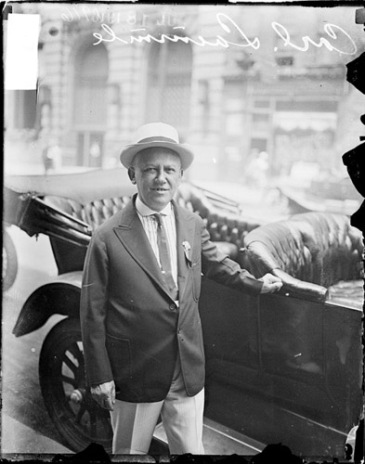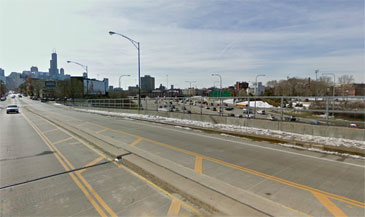Remembering The Chicago Movie Theater That Revolutionized The Movie Industry
By Steven Pate in Arts & Entertainment on Feb 24, 2012 8:20PM

DN-0066705, Chicago Daily News negatives collection, Chicago History Museum.
The White Front wasn't the first nickelodeon (a type of theater showing motion pictures to a seated audience, typically charging a nickel per ticket), even in Chicago, but when it opened in 1906 it was the first runaway success. Before nickelodeons, movies were shown in all kinds of random places, from fairgrounds to vaudeville theaters, but were not considered a destination in and of themselves. The cheap admission and large seating capacity of the nickelodeons were essential to the movies to becoming a mass entertainment.
A 39-year-old German immigrant, Laemmle had no experience in the movies when he took a risk pouring his savings—scratched out from years in a dry goods business in Oshkosh, Wis.—into what was then a very new technology. He daringly chose a location far from Chicago's Loop, hoping the trolley line and large numbers of immigrants in the entertainment-poor neighborhood would make his theater as successful as the one had seen in Pittsburgh. It definitely was. Benard F. Dick wrote:
Located next to a milliner at 909 North Milwaukee Avenue, the White Front was accessible by trolley. Since Saturday was a shopping day, Carl thought that by mid-afternoon shoppers might want a diversion before returning home, and with sundown so early, observant Jews could drop in later. The gimmick worked; when the doors closed, Carl had taken in two hundred dollars—not bad, considering the price of admission. Thereafter, the White Front operated on a regular morning through evening schedule, which meant the difference between 1,400 paid admissions on 24 February and 4,000 the next day.
"Nickel Theatre Pays Well; Small Cost and Big Profit," the Tribune declared in April. There would be 150 copycats by the next year, and 300 by 1908. The movies were becoming suddenly lucrative, and soon he opened a second location on Halsted. Laemmle ran a great theater. The whipsmart boy whom he hired to play the piano certainly learned a lot: Sam Katz eventually went on to help build some of the greatest theaters in Chicago, among them the Chicago Theatre and the Uptown Theatre.
 When the savvy Laemmle saw the exhibition landscape becoming too crowded, he turned to distribution. The Laemmle Film Service became the largest movie distributor in the country, grossing five figures a week and quickly overspilling its Chicago headquarters. Laemmle eventually grew tired fighting the good fight vs. the lawyered up, patent-weilding behemoths of the film distribution business and figured making movies himself was better than dealing with the crooked powerhouses.
When the savvy Laemmle saw the exhibition landscape becoming too crowded, he turned to distribution. The Laemmle Film Service became the largest movie distributor in the country, grossing five figures a week and quickly overspilling its Chicago headquarters. Laemmle eventually grew tired fighting the good fight vs. the lawyered up, patent-weilding behemoths of the film distribution business and figured making movies himself was better than dealing with the crooked powerhouses.
He took the fortune he reaped in Chicago and created his own film company. This led him away from his hard-won, swanky digs on Grand Avenue to New York City, but that was only a waypoint. California was calling, and while Laemmle was not the only to see that call, he became the first to raise it. In 1912, Laemmle joined forces with three other film companies to create the Universal Motion Picture Company. Plenty thought he was crazy to spend $165,000 for 230 pretty useless acres in the San Fernando Valley, but by the time Universal City was finished in 1915, nobody did. The world had its first movie studio, and the sprawling complex became an incredible success.
Carl Laemmle's career change happened because he saw an appetite for movies among the working classes of Chicago. He went on to turn a business into an industry, changing the world as well as his adopted city, and it all started at the White Front Theater, on Febuary 24, 1906. If you're on the Kennedy expressway today, you'll drive through its ghost as you pass under Milwaukee Avenue. If you're at 909 N. Milwaukee, you won't find anything to mark the spot as you cross over the expressway. Yet if it hadn't been for that long-forgotten little storefront, there probably wouldn't be anything special on television this Sunday night for us to complain about at all.
UPDATE: As commenter Broan points out below, the White Front Theater's address predates the 1909 renumbering of Chicago's streets, which means it was much more likely to have been in the spot now known as 1257 N Milwaukee Ave. While the Kiss 'N Tell Lingerie Store currently occupying the location may lack the metaphoric power of an anonymous expressway overpass, we'll take the hilarity of its storefront as a perfectly fitting, Hollywood-style, life-goes-on postscript. Carl Laemmle would surely have had a chuckle.